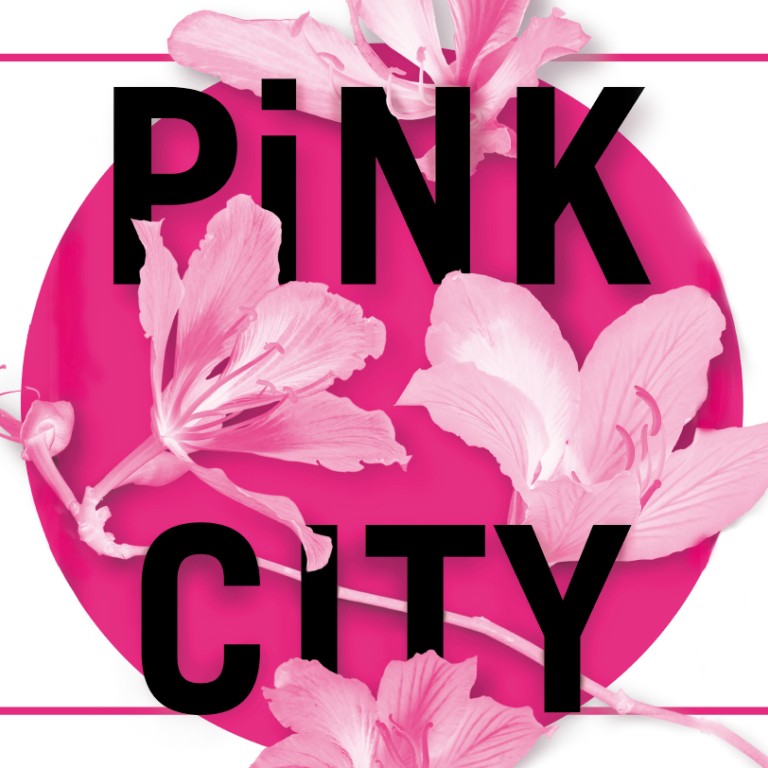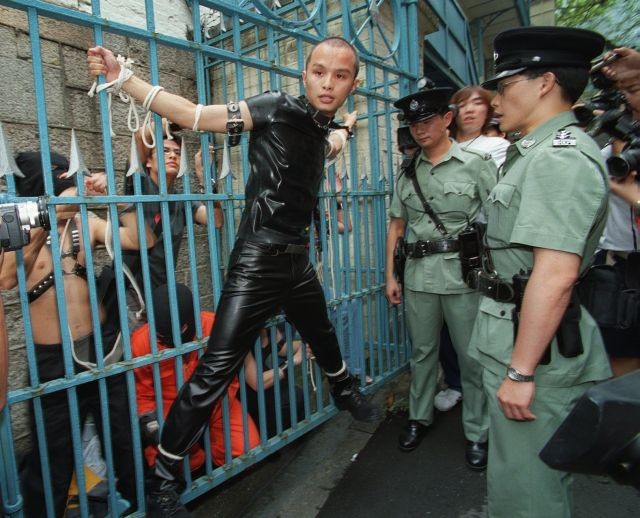
Pink City: Equality, Love and Pride in Hong Kong
It’s not that difficult: Equality’s good for everyone. Our city is quietly, irrevocably changing to become more equal, more inclusive, and better. On the eve of the Pink Dot festival on September 20, where we all get together to celebrate the theme “Love is Love,” we speak to the city’s LGBTI (lesbian, gay, bisexual, transgender and intersex) community about how the city could do better... and what it does fabulously.
The Pink Calendar

Click here for everything you need to know about Hong Kong's pinkest season.
The Pink Dot Index
Is our city changing far enough? In honor of the annual Pink Dot fest we've created the Pink Dot Index, designed to create a barometer of the most gay-friendly companies, public figures, places and more in Hong Kong. Look for it regularly in the pages of HK Magazine.

We want YOU to define the Pink Dot Index. We want YOUR ideas for what should factor into the PDI, from companies to public figures to places. Write us [email protected] with your ideas. Put "Pink Dot Index" in the subject or we won't pay attention.

(Photo: Jonathan Wong/SCMP)
Anthony Wong Yiu-ming
Wong was a member of Cantopop duo Tat Ming Pair. He came out to his fans in April 2012 at the end of a gig at the Hong Kong Coliseum. He’s the founder of LGBT group Big Love Alliance.
“Hong Kong claims to be a cosmopolitan city: It must work harder to learn and become genuinely cosmopolitan so it won’t lag behind other international cities in being inclusive towards sexual minorities. Besides being inclusive we must learn to give them adequate protection and equal treatment in conducting their everyday lives.”

(Photo: Nora Tam/SCMP)
Gregory Wong Chung-yiu
Wong made his name thanks to starring roles in HKTV dramas “The Election” and “The Menu.” He’s an official ambassador for Pink Dot 2015.
“‘Love is Love’ means we should interpret love as it is: It is an equal right for every one of us, to love whoever we want. I believe every one of us has the capacity to be inclusive and accommodating to others—including those who are different.”

Marty Forth (L) and Patrick Sinclair (R) have been married for nine years and moved to Hong Kong from New York last January. Patrick is a criminal defense lawyer and Marty is a stay-at-home dad. Their adopted son Grayson is five years old.
HK Magazine: How did you meet?
Marty Forth: Patrick and I met online when we were both living in Queens, New York. We were in a chat room for people living there. I started up a conversation with him because he had a great smile and very rosy cheeks in his pictures. We went on a date the next night and have been together ever since.
HK: What’s the secret to staying in love?
MF: I am not sure if there is a magic formula for that. We have supported each other as we have both grown and changed as people, professionals, and as a couple. I would have to say keeping an open mind, talking things through, and being open to what the other needs and can offer. And lastly, being realistic.
HK: What’s the sweetest thing the other has done for you?
Patrick Sinclair: Marty threw me a dueling-pianos birthday party recently with 70 of my friends and family—people from every aspect of my life.

HK: Tell us about your son. What’s it like being fathers to a kid in Hong Kong?
MF: Our son is amazing! He loves playing, building, running and being very active. Most of all he loves us to tell him stories.
PS: It’s awesome. There’s so much stuff for kids in Hong Kong. There’s also a welcoming expat community—Grayson has been on more playdates in Hong Kong than in New York.
HK: How did you explain to your son how your family is different?
PS: The first time Grayson realized this was when he was two years old. Grayson walked into a coffee shop and the person working there asked where his mother was. He ran out and asked us about it. We told him to go back and tell the guy he has no mom, but he has two dads.
MF: We have an open adoption and our son knows his mother and spends time with her. In fact she was one of our first visitors, and is down as immediate family in our expat package, which is amazing.

(Photo: Dickson Lee/SCMP)
Raymond “Slow Beat” Chan
“Slow Beat” got his nickname during his time at Commercial Radio Hong Kong. The People Power legislator for New Territories East was outed during his election campaign, but Chan has embraced his role as the city’s first only openly gay politician.
“All Hong Kong citizens have a responsibility to build an inclusive society. My greatest wish is that Hong Kong should catch up with the world and enact LGBT anti-discrimination legislation to afford some protection to sexual minorities. A debate about same-sex civil union will be held in Legco this year. I hope that society can respect the equal rights of LGBT people.”

(Photo: May Tse/SCMP)
Michael Vidler
Vidler is a longstanding chamption of LGBT rights in Hong Kong. The human rights lawyer was instrumental in the landmark “W” case which allowed a transgender woman to marry her boyfriend.
“It seems that the Hong Kong government is steadfastly refusing to update itself and bring itself in line with comparable jurisdictions. It seems inexplicable. You would hope that governments do take proactive steps, but the Hong Kong government seems to be caught in a continual round of damage limitation and crisis management.”

(Photo: Nora Tam/SCMP)
Kaspar Wan is a transgender activist and the founder of Gender Empowerment, which provides speech therapy sessions for transgender people and employment counseling and support.
HK Magazine: What’s important for transgender individuals in Hong Kong?
Kaspar Wan: Awareness is still one of the most important things. But it is not just to be aware of their existence, but be aware of their needs. Support from family and friends, and equal opportunities in employment. In thinking of the trans community, the general impression from Hong Kong people is that trans people have medical needs, because they want surgery to be a different gender. They don’t know the other meanings of what it means to be transgender: Not to be the other gender, but to be themselves.
HK: What’s the one most important thing an ally could do to help?
KW: Not to judge. Listen. Try to show that you are friendly, that you like to listen and want to learn more about the story—the reason behind the decision.

Kaspar with global trans activists at the UN's "Being LGBT in Asia'"Regional Dialogue meeting in Bangkok
HK: What’s the hardest thing you’ve had to deal with as a trans person?
KW: The hardest thing is that people have a very binary concept of gender. So they have a very stereotyped concept about gender and how a transgender person should be. Even when I talk to the transgender community, they still have that very binary concept. They would very much like to be accepted, and they think that being the stereotype of the gender can get acceptance more easily. But I see variety and diversity among men and women. We always say that gender is a spectrum. From the masculine to the feminine end, there are varieties and differences. People don’t realize that diversity.
See Kaspar’s short film “Kaspar X - If I had a soul” at the Hong Kong Lesbian & Gay Film Festival on Sep 28 or Oct 3.

Betty Grisoni (L) and Abby Lee (R) are Hong Kong’s lesbian royalty. They have been married for 16 years and moved to Hong Kong 14 years ago. They are the organizers of Les Peches, which hosts events for lesbian and bisexual women, the founders of marriage equality group Double Happiness, and co-directors of Pink Dot 2015.
HK Magazine: How have you stayed together for so long?
Betty Grisoni: There’s a secret we can share—“who plays together, stays together.” This means you have fun together. It doesn’t mean you have to have all the same interests, but there has to be one thing you both enjoy.
Abby Lee: With many things culture-wise we were similar—French and Chinese people love their food, and we were raised in families with the same respect for elders.
HK: What’s the sweetest thing the other has done for you?
BG: Saying yes to me at a commitment ceremony in front of other people, when people said negative things [about it].
AL: It’s the little things—surprising me in the mornings with breakfast.
HK: Was it difficult coming out to your friends and family?
AL: I came out when I was 9 or 10. I told my mom I liked to play with boys, but I wanted to marry girls. My mom told me I was still very young and that I might not know what I wanted yet, and said that maybe later I could decide again. I came out again when I was 21. Later, I brought Betty home after our third date to meet my family.
BG: It’s a stereotype that Chinese families are traditional and Western families more OK [with homosexuality], but it didn’t go down well at all with my family. Abby went to my parents to ask for my hand, but they didn’t accept her. For a year and a half we didn’t really talk, but little by little, they accepted it, and now they love Abby more than they love me!
HK: What difficulties do you face in Hong Kong?
AL: LGBT couples who were legally married oversees might face difficulties, because if one partner gets a job here, the other would not be entitled to a spouse permit and might have to come in as a tourist. If one of them is in hospital, the other might not be allowed to visit or make decisions for them. We’re not fighting for special treatment, just equal rights.
LGBT Rights in Hong Kong
The criminalization of homosexuality in Hong Kong came from British laws, but it was only as late as 1991 that Legco decriminalized consensual homosexual relations for men under 21. It took another 15 years, until 2006, before the age of consent was equalized to 16, the same as heterosexual relationships. (The law has always remained silent on lesbian relationships, presumably because the British didn’t believe they existed.)
There’s currently no law against discrimination on the grounds of sexual orientation, outside of government employment. Which means that yes—you can indeed not get that job because you’re gay. A 2013 study found that 60 percent of people agreed that Hong Kong should enact legislation to protect people against discrimination based on sexual orientation, so at least we’re getting somewhere.

Tommy Chen of gay rights pressure group Rainbow Action ties himself to the railings of Central Police Station in 2001 (Photo: Oliver Tsang/SCMP)
Same-sex marriage and civil unions aren’t recognized in Hong Kong. In May this year, a British lesbian woman challenged the high court after the Immigration Department refused to recognize her civil partnership and grant a dependent visa. Judgment in the case will be handed down at the end of November.
Meanwhile, in May 2013 the Court of Final Appeal of Hong Kong ruled that a postoperative transsexual woman known as “W” had the right to marry her boyfriend. However, the government has dragged its heels when it came to enacting legislation. “After the ‘W’ case, Hong Kong was entitled to expect a comprehensive gender recognition ordinance,” says human rights lawyer Michael Vidler, who acted for “W.” “It seems to me glaringly obvious what the Court of Final Appeal was speaking to, and the government has just chosen to ignore that. They never even attempted to put it together.”

